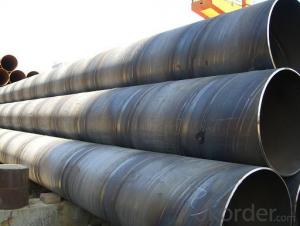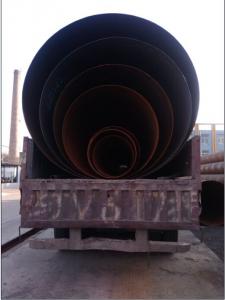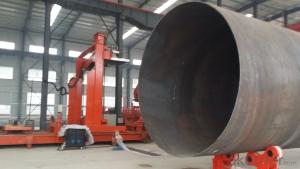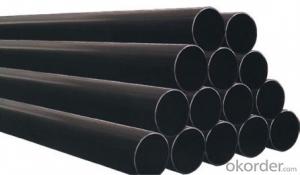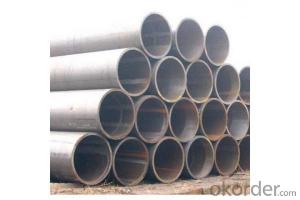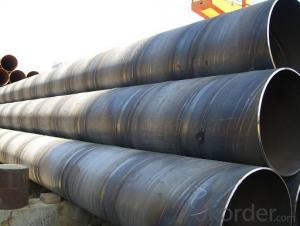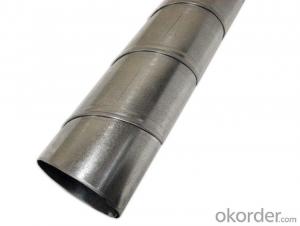48'' Carbon Steel SSAW Welded Pipe API/ASTM/JIS/DIN
- Loading Port:
- Tianjin
- Payment Terms:
- TT or LC
- Min Order Qty:
- 5 m.t
- Supply Capability:
- 300 m.t/month
OKorder Service Pledge
OKorder Financial Service
You Might Also Like
Product Description:
48'' Carbon Steel Welded Pipe API / ASTM / JIS / DIN
OKorder is offering high quality 48’’ Carbon Steel Welded Pipe API / ASTM / JIS / DIN at great prices with worldwide shipping. Our supplier is a world-class manufacturer of carbon steel. Our pipes and steel products are utilized the world over, with OKorder annually supplying a full range of products to European, North American and Asian markets.
Our 48’’ Carbon Steel Welded Pipe API / ASTM / JIS / DIN is ideal for:
Oil
Fuel gas
Natural gas
Water pipes
Thermal electrical pipe
Steel structure engineering
Not only is OKorder's 48’’ Carbon Steel Welded Pipe API / ASTM / JIS / DIN of the highest quality and reliability, we are able to quickly ship orders within 20 days of receiving a deposit or original L/C.
Main features of our 48’’ Carbon Steel Welded Pipe API / ASTM / JIS / DIN
· Corrosion resistance
· Rapid shipping
· Customizable
Specifications:
Material: Q235, Q345, L245, L290, L360, L415, L450, L485, GrB, X42, 46, X52, X56, X60, X65, X70, X80, X100
Standard: SY / T5037-2000, GB / T9711-2011, API Spec 5L PSL1 / PSL2, ASTM A252 \ A53, ISO3183, DIN17172, EN10217, JIS G3457, AWWA C200, ASTM A139, ASTM A671, ASTM A672
Wall Thickness: 3.0mm – 30mm
Outer Diameter: 168mm – 3020mm
Length: 5m – 12m (as per customer request)
Corrosion Resistance: DIN30670, DIN30671, AWWAC210, AWWA C203, SY/T0413-2002, SY/T0414-2002
Q195-q345 Material Steel Pipe's Materials
Elements | Chemical Compsition% | Mechanical Property | ||||||
C% | Mn% | S% | P% | Si% | Yield Point (Mpa) | Tensile Strength(Mpa) | Elongation | |
Q195 | 0.06-0.12 | 0.25-0.50 | <0.050< span=""> | <0.045< span=""> | <0.030< span=""> | >195 | 315-430 | 32-33 |
Q215 | 0.09-0.15 | 0.25-0.55 | <0.05< span=""> | <0.045< span=""> | <0.030< span=""> | >215 | 335-450 | 26-31 |
Q235 | 0.12-0.20 | 0.30-0.70 | <0.045< span=""> | <0.045< span=""> | <0.030< span=""> | >235 | 375-500 | 24-26 |
Q345 | <0.20< span=""> | 1.0-1.6 | <0.040< span=""> | <0.040< span=""> | <0.55< span=""> | >345 | 470-630 | 21-22 |
Packaging & Delivery
Packaging Detail: | Normal exporting packing,in container or bulk vessel or as per clients' request |
Delivery Detail: | 2 months after confimed contract |
FAQ:
Q1: Why buy Materials & Equipment from OKorder.com?
A: All products offered byOKorder.com are carefully selected from China's most reliable manufacturing enterprises. Through its ISO certifications, OKorder.com adheres to the highest standards and a commitment to supply chain safety and customer satisfaction.
Q2: How do we guarantee the quality of our products?
A: We have established an advanced quality management system which conducts strict quality tests at every step, from raw materials to the final product. At the same time, we provide extensive follow-up service assurances as required.
- Q: How are steel pipes used in the automotive manufacturing industry?
- Steel pipes are commonly used in the automotive manufacturing industry for various purposes such as exhaust systems, chassis frames, and structural components. These pipes provide durability, strength, and resistance to corrosion, making them ideal for applications that require high performance and reliability.
- Q: How are steel pipes used in the manufacturing of shipbuilding and offshore structures?
- Steel pipes are widely used in the manufacturing of shipbuilding and offshore structures due to their high strength and durability. These pipes are used for various purposes such as constructing the hull of the ship, creating structural supports and framework, and facilitating the transportation of fluids and gases. Their corrosion-resistant properties and ability to withstand extreme conditions make steel pipes an ideal choice for these applications.
- Q: Can steel pipes be bent or curved?
- Yes, steel pipes can be bent or curved using specialized machinery and techniques such as cold bending, induction bending, or hot bending.
- Q: What is the role of steel pipes in the food processing industry?
- Steel pipes play a crucial role in the food processing industry as they are used to transport various liquids, gases, and solid materials. They provide a safe and hygienic means of transferring ingredients, such as water, oils, and food products, from one processing stage to another. Steel pipes are resistant to corrosion and can withstand high temperatures, making them suitable for food processing environments. They also ensure the integrity and quality of the food by preventing contamination and maintaining proper sanitation standards.
- Q: Are steel pipes suitable for underground industrial waste disposal?
- Yes, steel pipes are generally suitable for underground industrial waste disposal. Steel pipes are durable, resistant to corrosion, and can withstand high pressure, making them a reliable choice for transporting and disposing of industrial waste underground. Additionally, steel pipes have a long lifespan and can be easily maintained, reducing the risk of leaks or contamination.
- Q: Can steel pipes be used for underground culverts?
- Yes, steel pipes can be used for underground culverts. Steel pipes are commonly used for underground culverts due to their strength, durability, and resistance to corrosion. They provide a reliable solution for conveying water or other fluids underground, ensuring efficient drainage and water management systems.
- Q: Can steel pipes be used for heating and cooling systems?
- Yes, steel pipes can be used for heating and cooling systems. Steel pipes are commonly used in HVAC (heating, ventilation, and air conditioning) systems as they have excellent heat transfer properties, durability, and can withstand high-pressure conditions. Additionally, steel pipes are resistant to corrosion, making them suitable for both heating and cooling applications.
- Q: What are the common factors affecting the flow capacity of steel pipes?
- The common factors affecting the flow capacity of steel pipes include the diameter of the pipe, the length and roughness of the pipe, the viscosity of the fluid being transported, and the overall pressure drop across the pipe.
- Q: What are the different joining methods for steel pipes?
- There are several different joining methods for steel pipes, including welding, threading, flanging, and mechanical coupling.
- Q: How are steel pipes used in the construction of water treatment plants?
- Steel pipes are widely used in the construction of water treatment plants due to their numerous advantages and suitability for this specific application. These pipes are utilized in various ways to ensure the efficient and reliable functioning of water treatment facilities. Firstly, steel pipes are commonly used in the transportation of water from its source to the treatment plant. They are highly durable and can withstand high pressure, ensuring the safe and secure delivery of water over long distances. Steel pipes are also resistant to corrosion, which is crucial in preventing contamination of the water supply. Within the treatment plant, steel pipes are used in the distribution system to transport water to different treatment processes. They are often laid underground or within the facility's infrastructure, ensuring a seamless flow of water between different treatment units. Steel pipes are known for their high strength and structural integrity, making them suitable for this purpose. Furthermore, steel pipes are used in the construction of various water treatment equipment. For instance, they are utilized in the construction of sedimentation tanks, where water is allowed to settle, and impurities are removed. Steel pipes are also used in the construction of filtration systems, where water passes through different layers of filters to remove contaminants. Another important application of steel pipes in water treatment plants is in the construction of pumping stations. These stations are responsible for maintaining the water flow throughout the treatment process. Steel pipes are employed in the design and construction of the pumping systems to ensure the efficient movement of water between different stages of treatment. In summary, steel pipes play a crucial role in the construction of water treatment plants. They are used for the transportation of water, distribution within the facility, construction of treatment equipment, and in the design of pumping stations. Their durability, resistance to corrosion, and high strength make them an ideal choice for this critical infrastructure.
Send your message to us
48'' Carbon Steel SSAW Welded Pipe API/ASTM/JIS/DIN
- Loading Port:
- Tianjin
- Payment Terms:
- TT or LC
- Min Order Qty:
- 5 m.t
- Supply Capability:
- 300 m.t/month
OKorder Service Pledge
OKorder Financial Service
Similar products
Hot products
Hot Searches
Related keywords
